BU52032 - How Emotional Intelligence Impacts Project Performance
VerifiedAdded on 2023/04/23
|18
|4051
|210
Report
AI Summary
This report explores the impact of emotional intelligence (EQ) on project performance. It begins by defining emotional intelligence as the ability to monitor and differentiate emotions, guiding behavior and influencing others. The literature survey examines how EQ enhances project success through improved communication, conflict resolution, and team motivation. It also addresses the potential dark side of EQ, where it can be used to manipulate decision-making. The report highlights the increasing importance of EQ in a tech-enabled environment and its role in leadership. Interpersonal management approaches, such as active listening and empathy, are suggested to improve project performance by analyzing emotions. The report concludes that deploying EQ can significantly enhance project outcomes by fostering better relationships, managing conflicts effectively, and motivating teams.
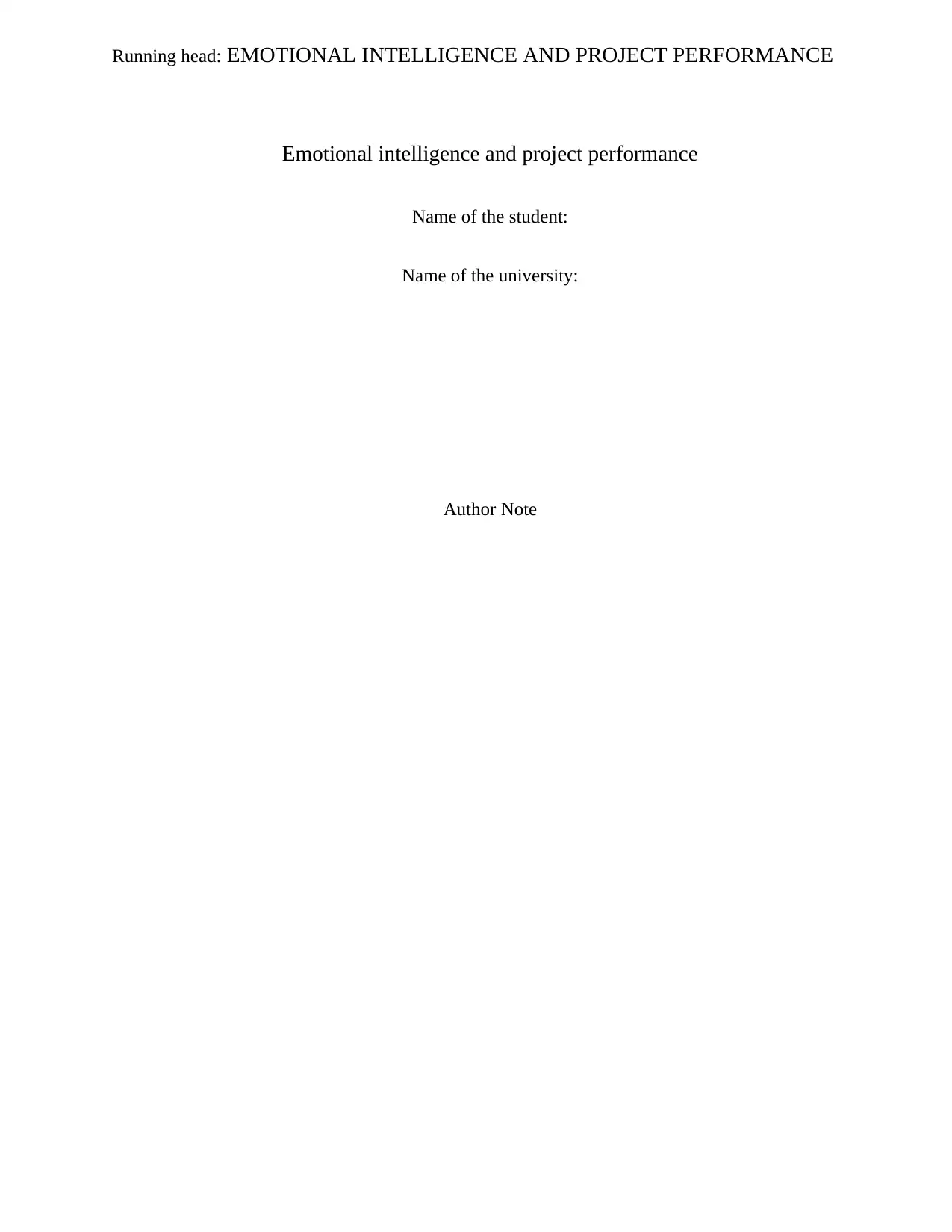
Running head: EMOTIONAL INTELLIGENCE AND PROJECT PERFORMANCE
Emotional intelligence and project performance
Name of the student:
Name of the university:
Author Note
Emotional intelligence and project performance
Name of the student:
Name of the university:
Author Note
Paraphrase This Document
Need a fresh take? Get an instant paraphrase of this document with our AI Paraphraser
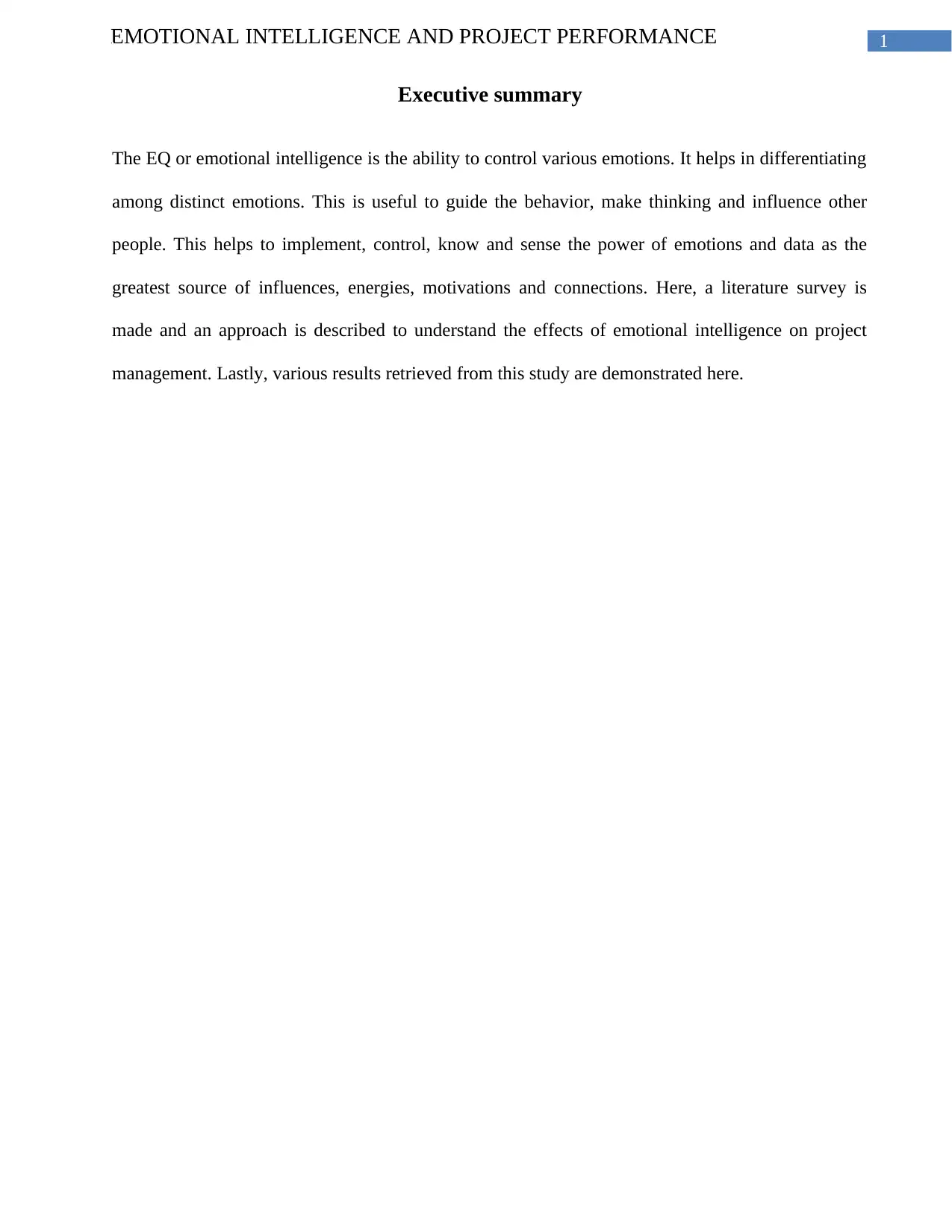
1EMOTIONAL INTELLIGENCE AND PROJECT PERFORMANCE
Executive summary
The EQ or emotional intelligence is the ability to control various emotions. It helps in differentiating
among distinct emotions. This is useful to guide the behavior, make thinking and influence other
people. This helps to implement, control, know and sense the power of emotions and data as the
greatest source of influences, energies, motivations and connections. Here, a literature survey is
made and an approach is described to understand the effects of emotional intelligence on project
management. Lastly, various results retrieved from this study are demonstrated here.
Executive summary
The EQ or emotional intelligence is the ability to control various emotions. It helps in differentiating
among distinct emotions. This is useful to guide the behavior, make thinking and influence other
people. This helps to implement, control, know and sense the power of emotions and data as the
greatest source of influences, energies, motivations and connections. Here, a literature survey is
made and an approach is described to understand the effects of emotional intelligence on project
management. Lastly, various results retrieved from this study are demonstrated here.
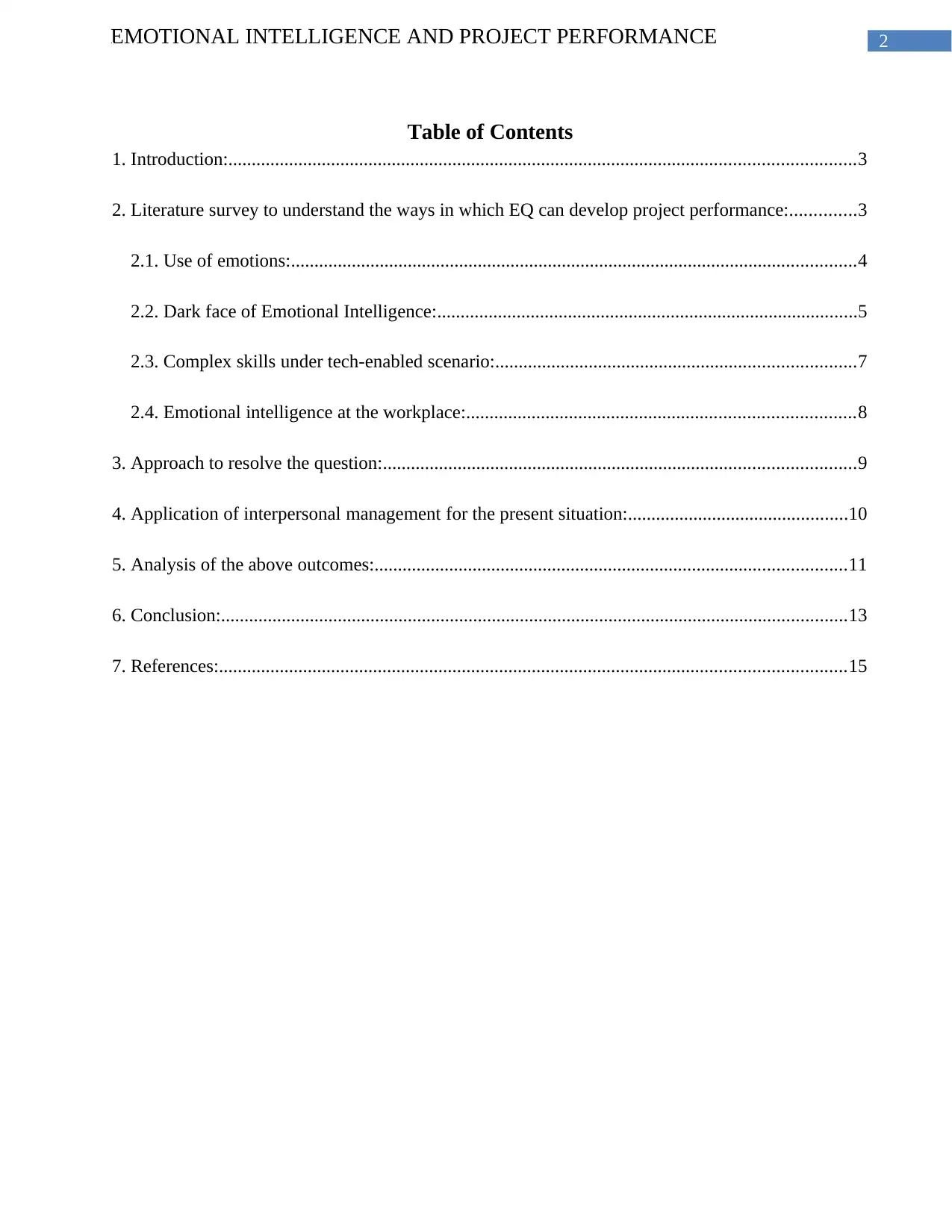
2EMOTIONAL INTELLIGENCE AND PROJECT PERFORMANCE
Table of Contents
1. Introduction:......................................................................................................................................3
2. Literature survey to understand the ways in which EQ can develop project performance:..............3
2.1. Use of emotions:.........................................................................................................................4
2.2. Dark face of Emotional Intelligence:..........................................................................................5
2.3. Complex skills under tech-enabled scenario:.............................................................................7
2.4. Emotional intelligence at the workplace:...................................................................................8
3. Approach to resolve the question:.....................................................................................................9
4. Application of interpersonal management for the present situation:...............................................10
5. Analysis of the above outcomes:.....................................................................................................11
6. Conclusion:......................................................................................................................................13
7. References:......................................................................................................................................15
Table of Contents
1. Introduction:......................................................................................................................................3
2. Literature survey to understand the ways in which EQ can develop project performance:..............3
2.1. Use of emotions:.........................................................................................................................4
2.2. Dark face of Emotional Intelligence:..........................................................................................5
2.3. Complex skills under tech-enabled scenario:.............................................................................7
2.4. Emotional intelligence at the workplace:...................................................................................8
3. Approach to resolve the question:.....................................................................................................9
4. Application of interpersonal management for the present situation:...............................................10
5. Analysis of the above outcomes:.....................................................................................................11
6. Conclusion:......................................................................................................................................13
7. References:......................................................................................................................................15
⊘ This is a preview!⊘
Do you want full access?
Subscribe today to unlock all pages.

Trusted by 1+ million students worldwide
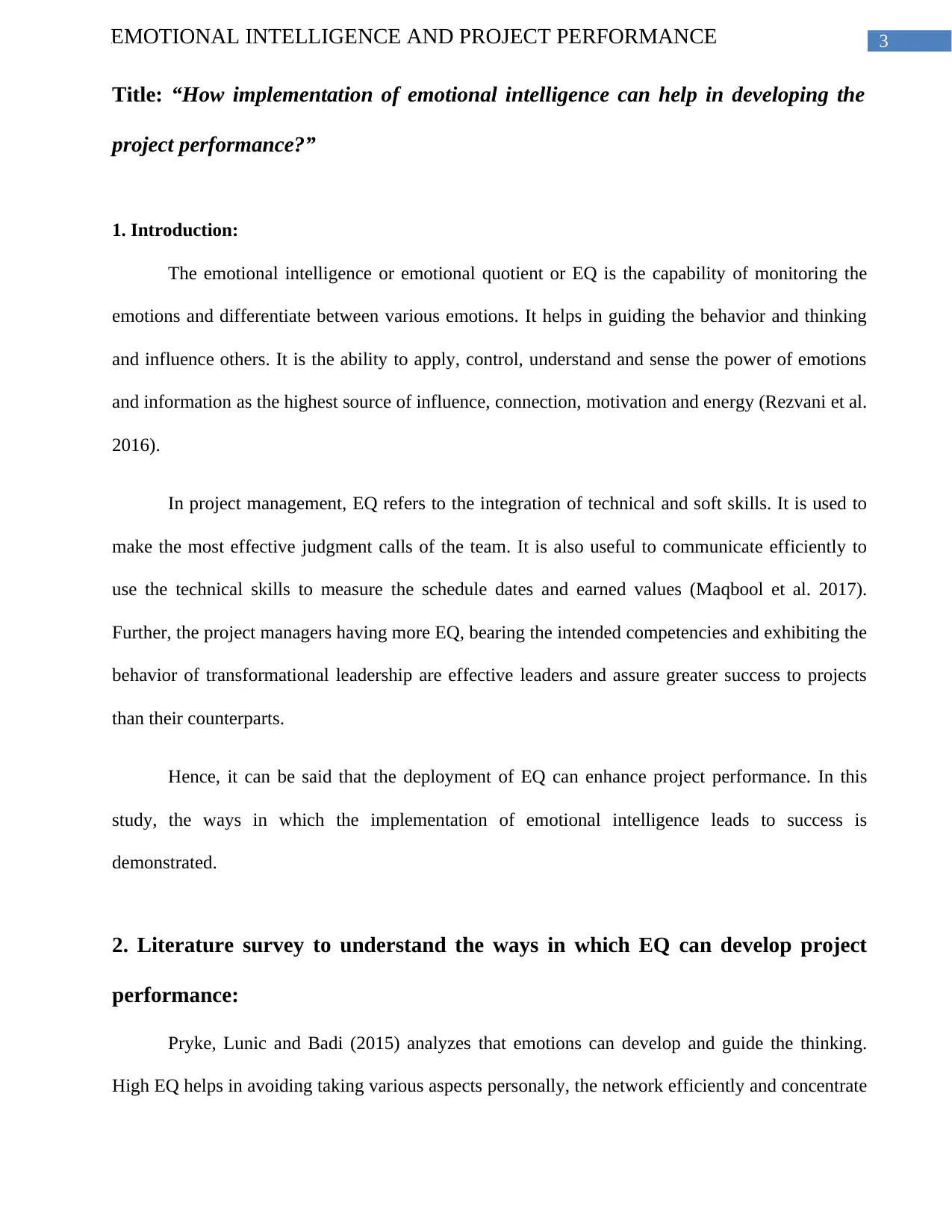
3EMOTIONAL INTELLIGENCE AND PROJECT PERFORMANCE
Title: “How implementation of emotional intelligence can help in developing the
project performance?”
1. Introduction:
The emotional intelligence or emotional quotient or EQ is the capability of monitoring the
emotions and differentiate between various emotions. It helps in guiding the behavior and thinking
and influence others. It is the ability to apply, control, understand and sense the power of emotions
and information as the highest source of influence, connection, motivation and energy (Rezvani et al.
2016).
In project management, EQ refers to the integration of technical and soft skills. It is used to
make the most effective judgment calls of the team. It is also useful to communicate efficiently to
use the technical skills to measure the schedule dates and earned values (Maqbool et al. 2017).
Further, the project managers having more EQ, bearing the intended competencies and exhibiting the
behavior of transformational leadership are effective leaders and assure greater success to projects
than their counterparts.
Hence, it can be said that the deployment of EQ can enhance project performance. In this
study, the ways in which the implementation of emotional intelligence leads to success is
demonstrated.
2. Literature survey to understand the ways in which EQ can develop project
performance:
Pryke, Lunic and Badi (2015) analyzes that emotions can develop and guide the thinking.
High EQ helps in avoiding taking various aspects personally, the network efficiently and concentrate
Title: “How implementation of emotional intelligence can help in developing the
project performance?”
1. Introduction:
The emotional intelligence or emotional quotient or EQ is the capability of monitoring the
emotions and differentiate between various emotions. It helps in guiding the behavior and thinking
and influence others. It is the ability to apply, control, understand and sense the power of emotions
and information as the highest source of influence, connection, motivation and energy (Rezvani et al.
2016).
In project management, EQ refers to the integration of technical and soft skills. It is used to
make the most effective judgment calls of the team. It is also useful to communicate efficiently to
use the technical skills to measure the schedule dates and earned values (Maqbool et al. 2017).
Further, the project managers having more EQ, bearing the intended competencies and exhibiting the
behavior of transformational leadership are effective leaders and assure greater success to projects
than their counterparts.
Hence, it can be said that the deployment of EQ can enhance project performance. In this
study, the ways in which the implementation of emotional intelligence leads to success is
demonstrated.
2. Literature survey to understand the ways in which EQ can develop project
performance:
Pryke, Lunic and Badi (2015) analyzes that emotions can develop and guide the thinking.
High EQ helps in avoiding taking various aspects personally, the network efficiently and concentrate
Paraphrase This Document
Need a fresh take? Get an instant paraphrase of this document with our AI Paraphraser
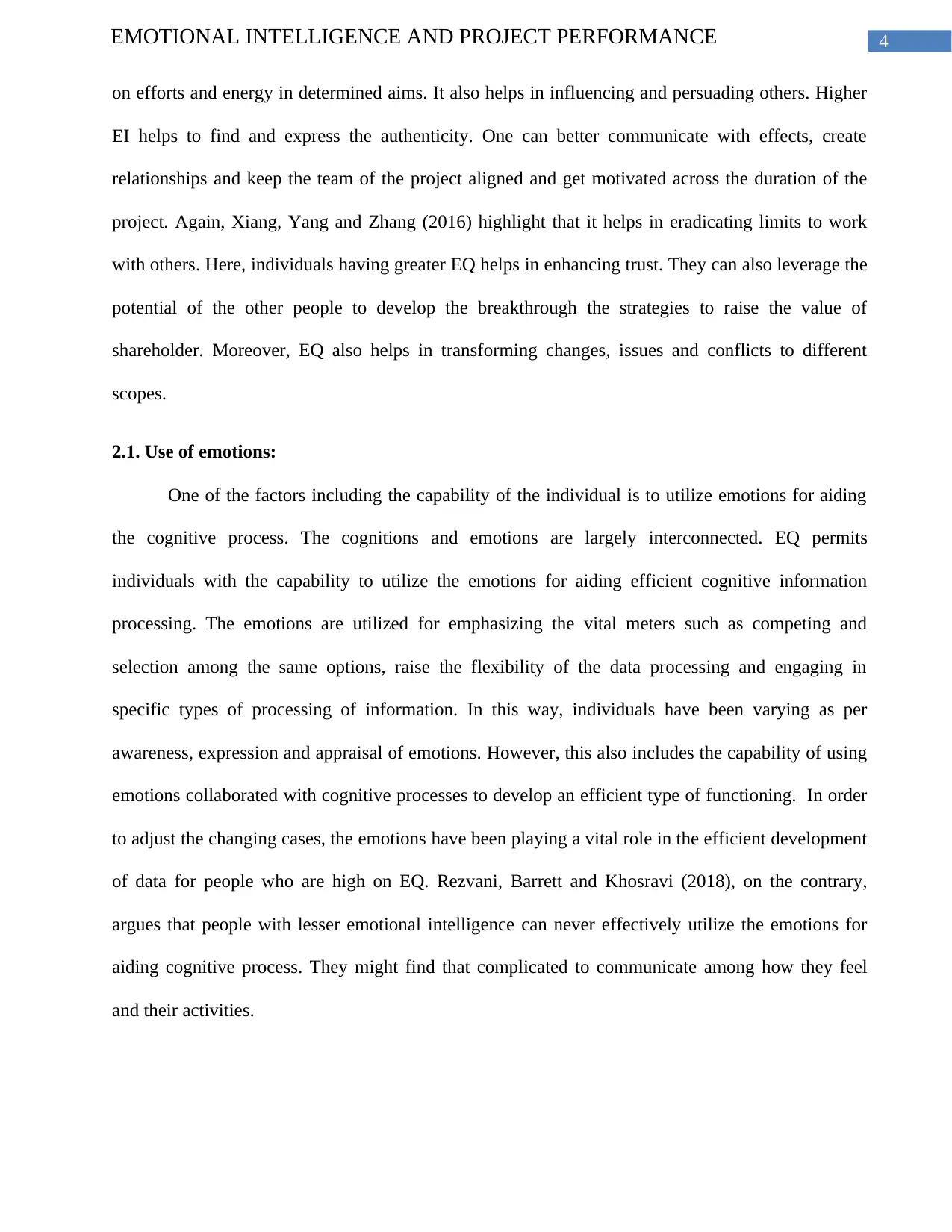
4EMOTIONAL INTELLIGENCE AND PROJECT PERFORMANCE
on efforts and energy in determined aims. It also helps in influencing and persuading others. Higher
EI helps to find and express the authenticity. One can better communicate with effects, create
relationships and keep the team of the project aligned and get motivated across the duration of the
project. Again, Xiang, Yang and Zhang (2016) highlight that it helps in eradicating limits to work
with others. Here, individuals having greater EQ helps in enhancing trust. They can also leverage the
potential of the other people to develop the breakthrough the strategies to raise the value of
shareholder. Moreover, EQ also helps in transforming changes, issues and conflicts to different
scopes.
2.1. Use of emotions:
One of the factors including the capability of the individual is to utilize emotions for aiding
the cognitive process. The cognitions and emotions are largely interconnected. EQ permits
individuals with the capability to utilize the emotions for aiding efficient cognitive information
processing. The emotions are utilized for emphasizing the vital meters such as competing and
selection among the same options, raise the flexibility of the data processing and engaging in
specific types of processing of information. In this way, individuals have been varying as per
awareness, expression and appraisal of emotions. However, this also includes the capability of using
emotions collaborated with cognitive processes to develop an efficient type of functioning. In order
to adjust the changing cases, the emotions have been playing a vital role in the efficient development
of data for people who are high on EQ. Rezvani, Barrett and Khosravi (2018), on the contrary,
argues that people with lesser emotional intelligence can never effectively utilize the emotions for
aiding cognitive process. They might find that complicated to communicate among how they feel
and their activities.
on efforts and energy in determined aims. It also helps in influencing and persuading others. Higher
EI helps to find and express the authenticity. One can better communicate with effects, create
relationships and keep the team of the project aligned and get motivated across the duration of the
project. Again, Xiang, Yang and Zhang (2016) highlight that it helps in eradicating limits to work
with others. Here, individuals having greater EQ helps in enhancing trust. They can also leverage the
potential of the other people to develop the breakthrough the strategies to raise the value of
shareholder. Moreover, EQ also helps in transforming changes, issues and conflicts to different
scopes.
2.1. Use of emotions:
One of the factors including the capability of the individual is to utilize emotions for aiding
the cognitive process. The cognitions and emotions are largely interconnected. EQ permits
individuals with the capability to utilize the emotions for aiding efficient cognitive information
processing. The emotions are utilized for emphasizing the vital meters such as competing and
selection among the same options, raise the flexibility of the data processing and engaging in
specific types of processing of information. In this way, individuals have been varying as per
awareness, expression and appraisal of emotions. However, this also includes the capability of using
emotions collaborated with cognitive processes to develop an efficient type of functioning. In order
to adjust the changing cases, the emotions have been playing a vital role in the efficient development
of data for people who are high on EQ. Rezvani, Barrett and Khosravi (2018), on the contrary,
argues that people with lesser emotional intelligence can never effectively utilize the emotions for
aiding cognitive process. They might find that complicated to communicate among how they feel
and their activities.
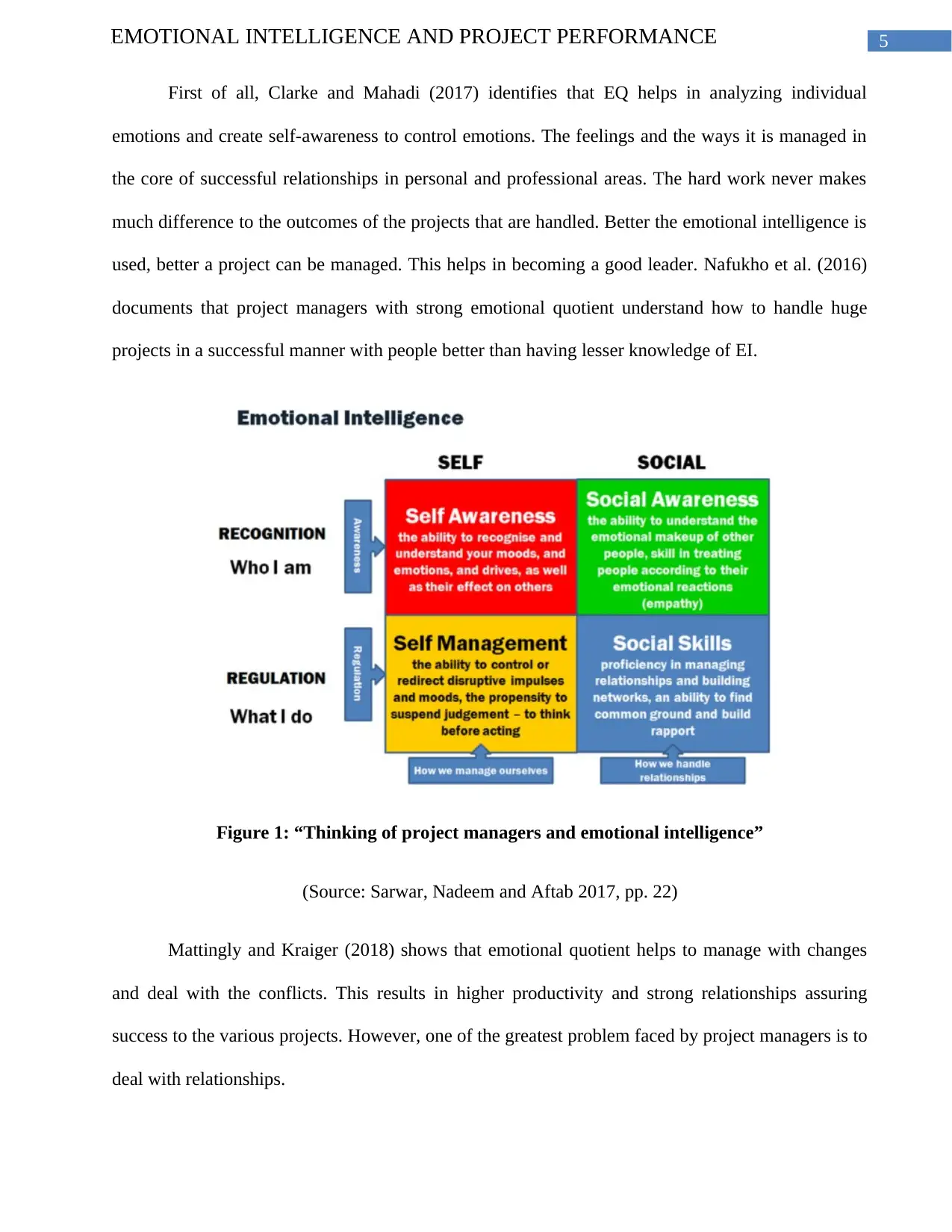
5EMOTIONAL INTELLIGENCE AND PROJECT PERFORMANCE
First of all, Clarke and Mahadi (2017) identifies that EQ helps in analyzing individual
emotions and create self-awareness to control emotions. The feelings and the ways it is managed in
the core of successful relationships in personal and professional areas. The hard work never makes
much difference to the outcomes of the projects that are handled. Better the emotional intelligence is
used, better a project can be managed. This helps in becoming a good leader. Nafukho et al. (2016)
documents that project managers with strong emotional quotient understand how to handle huge
projects in a successful manner with people better than having lesser knowledge of EI.
Figure 1: “Thinking of project managers and emotional intelligence”
(Source: Sarwar, Nadeem and Aftab 2017, pp. 22)
Mattingly and Kraiger (2018) shows that emotional quotient helps to manage with changes
and deal with the conflicts. This results in higher productivity and strong relationships assuring
success to the various projects. However, one of the greatest problem faced by project managers is to
deal with relationships.
First of all, Clarke and Mahadi (2017) identifies that EQ helps in analyzing individual
emotions and create self-awareness to control emotions. The feelings and the ways it is managed in
the core of successful relationships in personal and professional areas. The hard work never makes
much difference to the outcomes of the projects that are handled. Better the emotional intelligence is
used, better a project can be managed. This helps in becoming a good leader. Nafukho et al. (2016)
documents that project managers with strong emotional quotient understand how to handle huge
projects in a successful manner with people better than having lesser knowledge of EI.
Figure 1: “Thinking of project managers and emotional intelligence”
(Source: Sarwar, Nadeem and Aftab 2017, pp. 22)
Mattingly and Kraiger (2018) shows that emotional quotient helps to manage with changes
and deal with the conflicts. This results in higher productivity and strong relationships assuring
success to the various projects. However, one of the greatest problem faced by project managers is to
deal with relationships.
⊘ This is a preview!⊘
Do you want full access?
Subscribe today to unlock all pages.

Trusted by 1+ million students worldwide
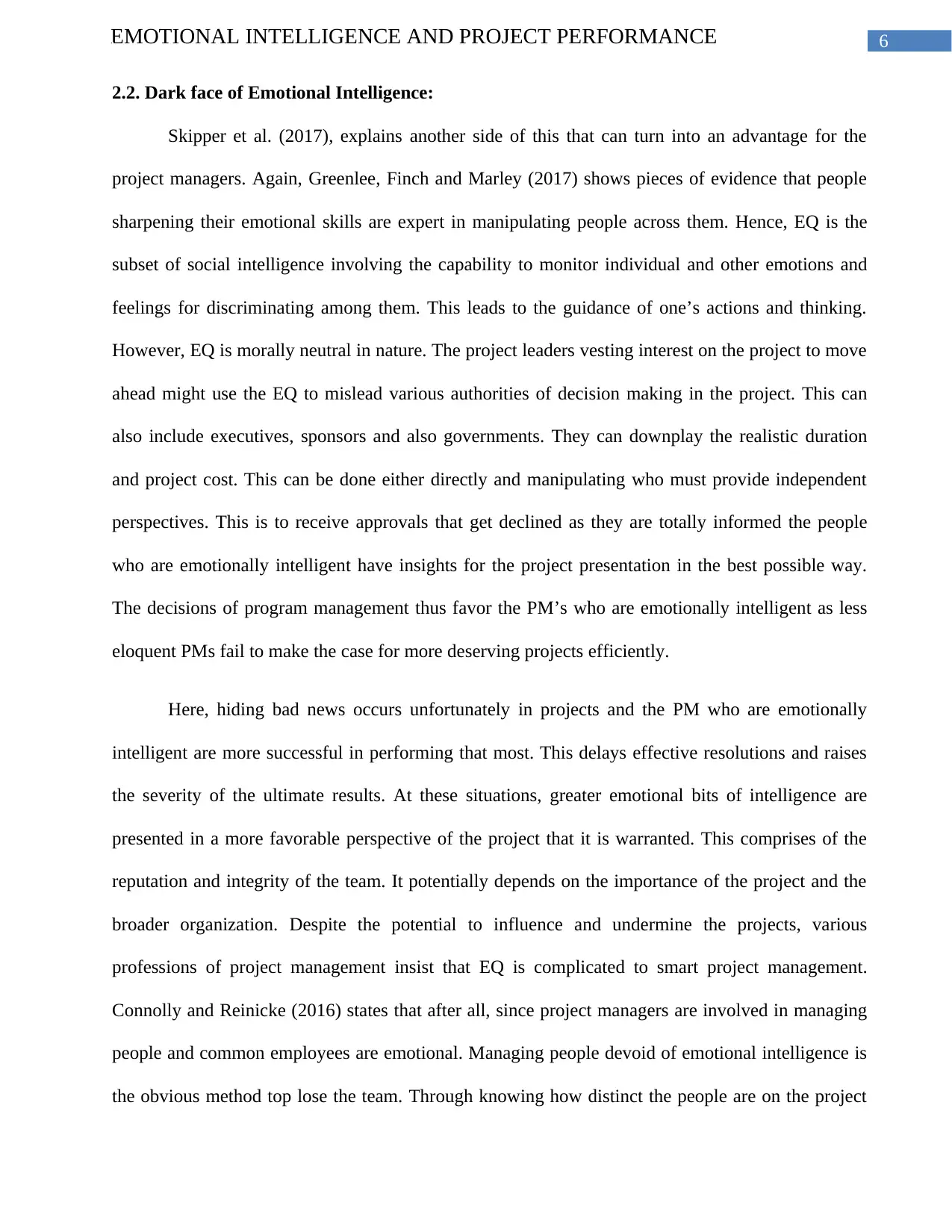
6EMOTIONAL INTELLIGENCE AND PROJECT PERFORMANCE
2.2. Dark face of Emotional Intelligence:
Skipper et al. (2017), explains another side of this that can turn into an advantage for the
project managers. Again, Greenlee, Finch and Marley (2017) shows pieces of evidence that people
sharpening their emotional skills are expert in manipulating people across them. Hence, EQ is the
subset of social intelligence involving the capability to monitor individual and other emotions and
feelings for discriminating among them. This leads to the guidance of one’s actions and thinking.
However, EQ is morally neutral in nature. The project leaders vesting interest on the project to move
ahead might use the EQ to mislead various authorities of decision making in the project. This can
also include executives, sponsors and also governments. They can downplay the realistic duration
and project cost. This can be done either directly and manipulating who must provide independent
perspectives. This is to receive approvals that get declined as they are totally informed the people
who are emotionally intelligent have insights for the project presentation in the best possible way.
The decisions of program management thus favor the PM’s who are emotionally intelligent as less
eloquent PMs fail to make the case for more deserving projects efficiently.
Here, hiding bad news occurs unfortunately in projects and the PM who are emotionally
intelligent are more successful in performing that most. This delays effective resolutions and raises
the severity of the ultimate results. At these situations, greater emotional bits of intelligence are
presented in a more favorable perspective of the project that it is warranted. This comprises of the
reputation and integrity of the team. It potentially depends on the importance of the project and the
broader organization. Despite the potential to influence and undermine the projects, various
professions of project management insist that EQ is complicated to smart project management.
Connolly and Reinicke (2016) states that after all, since project managers are involved in managing
people and common employees are emotional. Managing people devoid of emotional intelligence is
the obvious method top lose the team. Through knowing how distinct the people are on the project
2.2. Dark face of Emotional Intelligence:
Skipper et al. (2017), explains another side of this that can turn into an advantage for the
project managers. Again, Greenlee, Finch and Marley (2017) shows pieces of evidence that people
sharpening their emotional skills are expert in manipulating people across them. Hence, EQ is the
subset of social intelligence involving the capability to monitor individual and other emotions and
feelings for discriminating among them. This leads to the guidance of one’s actions and thinking.
However, EQ is morally neutral in nature. The project leaders vesting interest on the project to move
ahead might use the EQ to mislead various authorities of decision making in the project. This can
also include executives, sponsors and also governments. They can downplay the realistic duration
and project cost. This can be done either directly and manipulating who must provide independent
perspectives. This is to receive approvals that get declined as they are totally informed the people
who are emotionally intelligent have insights for the project presentation in the best possible way.
The decisions of program management thus favor the PM’s who are emotionally intelligent as less
eloquent PMs fail to make the case for more deserving projects efficiently.
Here, hiding bad news occurs unfortunately in projects and the PM who are emotionally
intelligent are more successful in performing that most. This delays effective resolutions and raises
the severity of the ultimate results. At these situations, greater emotional bits of intelligence are
presented in a more favorable perspective of the project that it is warranted. This comprises of the
reputation and integrity of the team. It potentially depends on the importance of the project and the
broader organization. Despite the potential to influence and undermine the projects, various
professions of project management insist that EQ is complicated to smart project management.
Connolly and Reinicke (2016) states that after all, since project managers are involved in managing
people and common employees are emotional. Managing people devoid of emotional intelligence is
the obvious method top lose the team. Through knowing how distinct the people are on the project
Paraphrase This Document
Need a fresh take? Get an instant paraphrase of this document with our AI Paraphraser
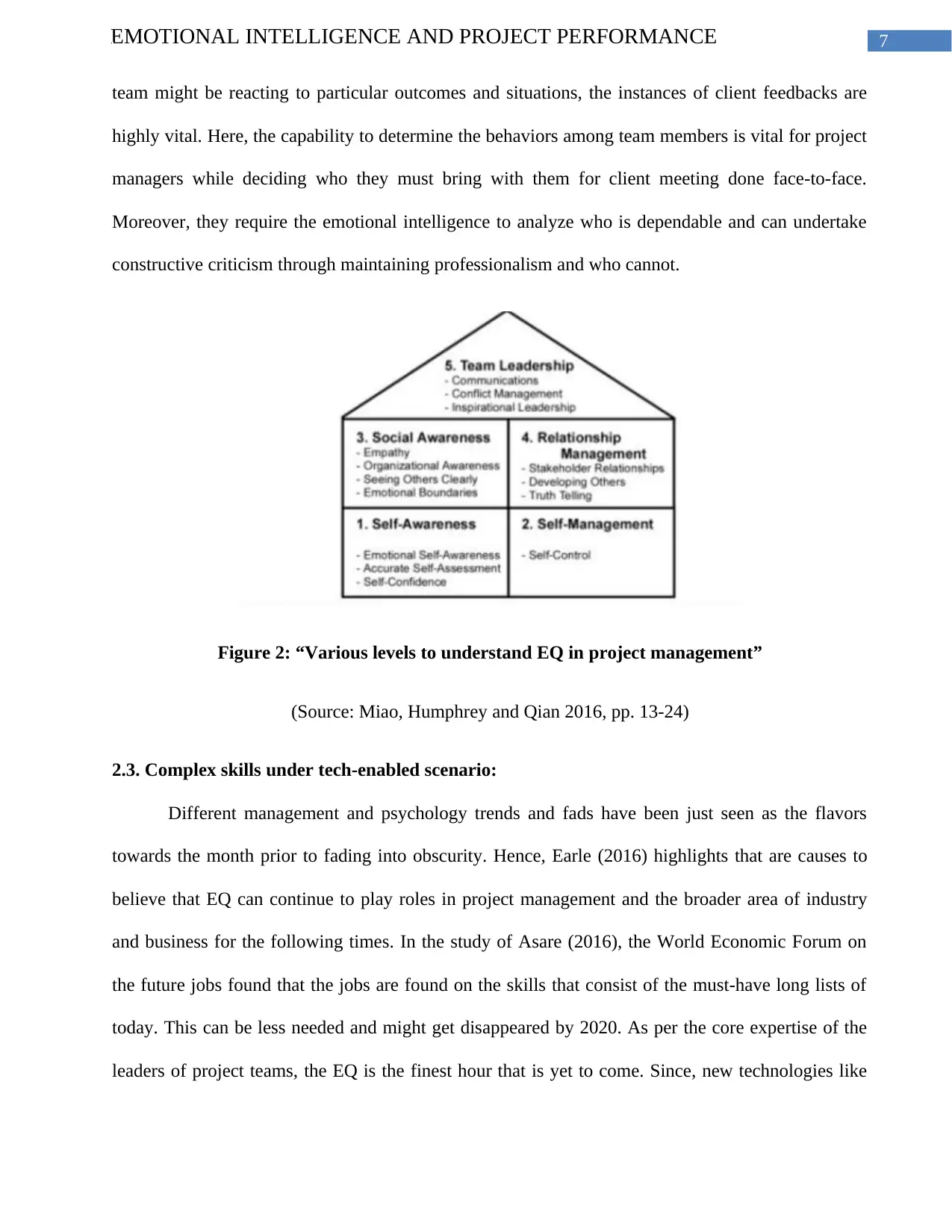
7EMOTIONAL INTELLIGENCE AND PROJECT PERFORMANCE
team might be reacting to particular outcomes and situations, the instances of client feedbacks are
highly vital. Here, the capability to determine the behaviors among team members is vital for project
managers while deciding who they must bring with them for client meeting done face-to-face.
Moreover, they require the emotional intelligence to analyze who is dependable and can undertake
constructive criticism through maintaining professionalism and who cannot.
Figure 2: “Various levels to understand EQ in project management”
(Source: Miao, Humphrey and Qian 2016, pp. 13-24)
2.3. Complex skills under tech-enabled scenario:
Different management and psychology trends and fads have been just seen as the flavors
towards the month prior to fading into obscurity. Hence, Earle (2016) highlights that are causes to
believe that EQ can continue to play roles in project management and the broader area of industry
and business for the following times. In the study of Asare (2016), the World Economic Forum on
the future jobs found that the jobs are found on the skills that consist of the must-have long lists of
today. This can be less needed and might get disappeared by 2020. As per the core expertise of the
leaders of project teams, the EQ is the finest hour that is yet to come. Since, new technologies like
team might be reacting to particular outcomes and situations, the instances of client feedbacks are
highly vital. Here, the capability to determine the behaviors among team members is vital for project
managers while deciding who they must bring with them for client meeting done face-to-face.
Moreover, they require the emotional intelligence to analyze who is dependable and can undertake
constructive criticism through maintaining professionalism and who cannot.
Figure 2: “Various levels to understand EQ in project management”
(Source: Miao, Humphrey and Qian 2016, pp. 13-24)
2.3. Complex skills under tech-enabled scenario:
Different management and psychology trends and fads have been just seen as the flavors
towards the month prior to fading into obscurity. Hence, Earle (2016) highlights that are causes to
believe that EQ can continue to play roles in project management and the broader area of industry
and business for the following times. In the study of Asare (2016), the World Economic Forum on
the future jobs found that the jobs are found on the skills that consist of the must-have long lists of
today. This can be less needed and might get disappeared by 2020. As per the core expertise of the
leaders of project teams, the EQ is the finest hour that is yet to come. Since, new technologies like
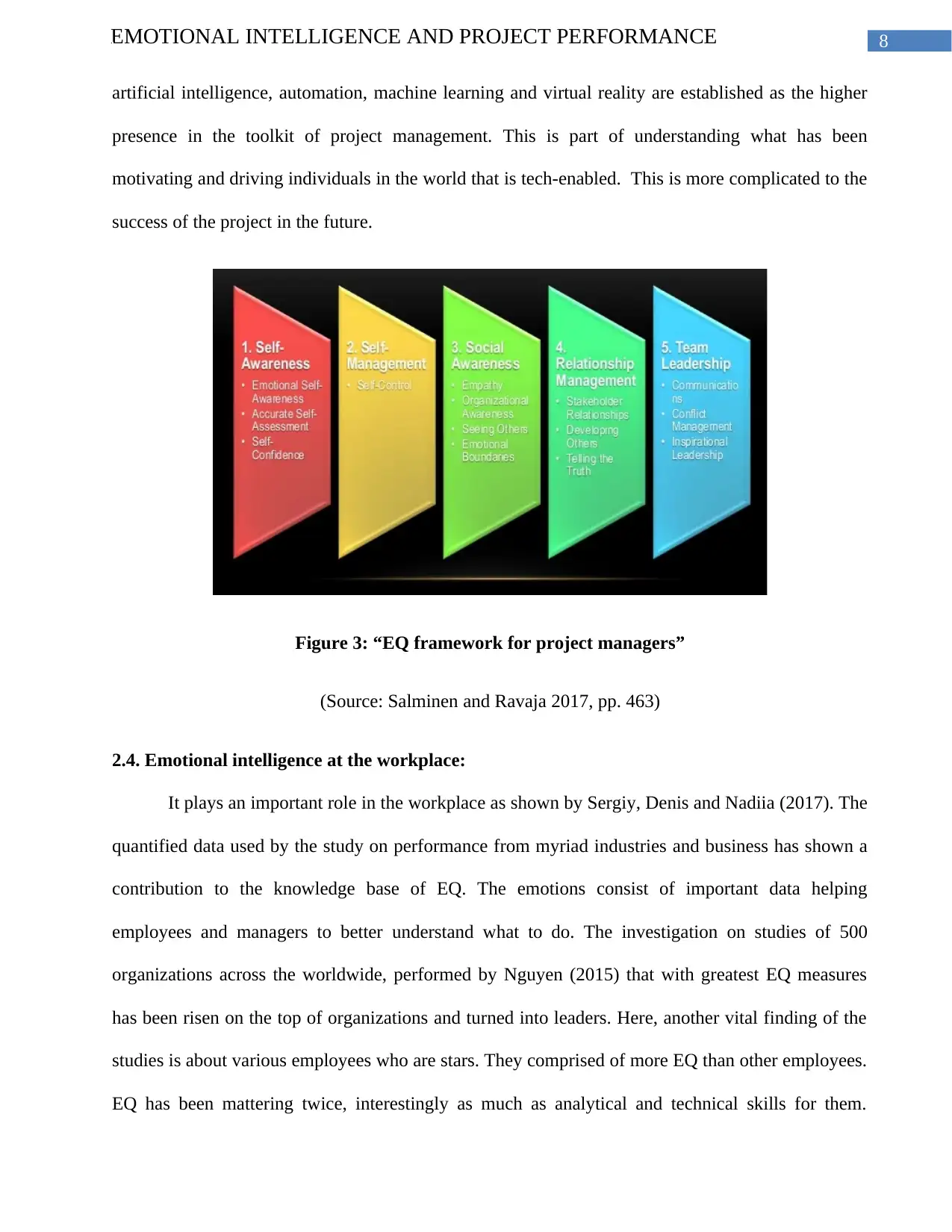
8EMOTIONAL INTELLIGENCE AND PROJECT PERFORMANCE
artificial intelligence, automation, machine learning and virtual reality are established as the higher
presence in the toolkit of project management. This is part of understanding what has been
motivating and driving individuals in the world that is tech-enabled. This is more complicated to the
success of the project in the future.
Figure 3: “EQ framework for project managers”
(Source: Salminen and Ravaja 2017, pp. 463)
2.4. Emotional intelligence at the workplace:
It plays an important role in the workplace as shown by Sergiy, Denis and Nadiia (2017). The
quantified data used by the study on performance from myriad industries and business has shown a
contribution to the knowledge base of EQ. The emotions consist of important data helping
employees and managers to better understand what to do. The investigation on studies of 500
organizations across the worldwide, performed by Nguyen (2015) that with greatest EQ measures
has been risen on the top of organizations and turned into leaders. Here, another vital finding of the
studies is about various employees who are stars. They comprised of more EQ than other employees.
EQ has been mattering twice, interestingly as much as analytical and technical skills for them.
artificial intelligence, automation, machine learning and virtual reality are established as the higher
presence in the toolkit of project management. This is part of understanding what has been
motivating and driving individuals in the world that is tech-enabled. This is more complicated to the
success of the project in the future.
Figure 3: “EQ framework for project managers”
(Source: Salminen and Ravaja 2017, pp. 463)
2.4. Emotional intelligence at the workplace:
It plays an important role in the workplace as shown by Sergiy, Denis and Nadiia (2017). The
quantified data used by the study on performance from myriad industries and business has shown a
contribution to the knowledge base of EQ. The emotions consist of important data helping
employees and managers to better understand what to do. The investigation on studies of 500
organizations across the worldwide, performed by Nguyen (2015) that with greatest EQ measures
has been risen on the top of organizations and turned into leaders. Here, another vital finding of the
studies is about various employees who are stars. They comprised of more EQ than other employees.
EQ has been mattering twice, interestingly as much as analytical and technical skills for them.
⊘ This is a preview!⊘
Do you want full access?
Subscribe today to unlock all pages.

Trusted by 1+ million students worldwide
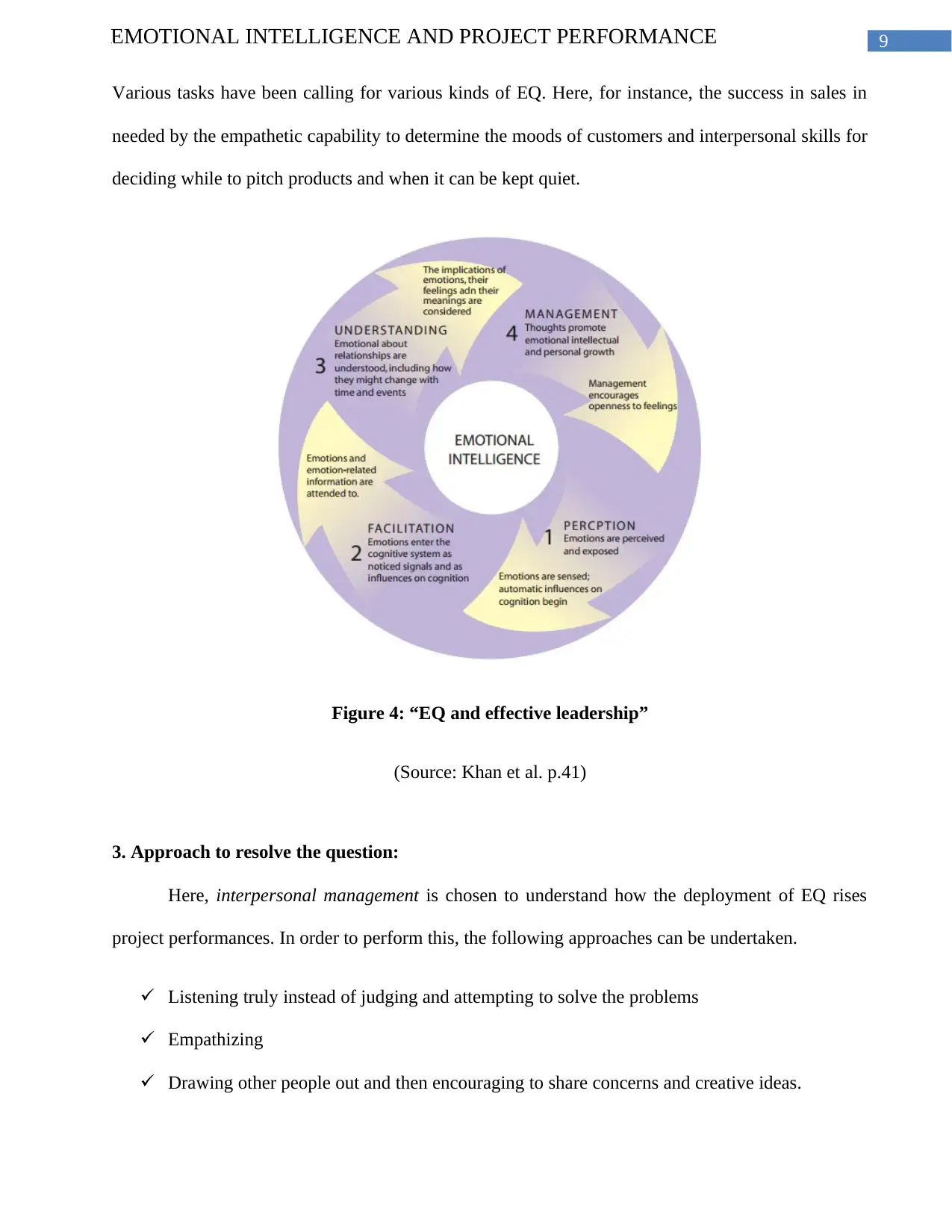
9EMOTIONAL INTELLIGENCE AND PROJECT PERFORMANCE
Various tasks have been calling for various kinds of EQ. Here, for instance, the success in sales in
needed by the empathetic capability to determine the moods of customers and interpersonal skills for
deciding while to pitch products and when it can be kept quiet.
Figure 4: “EQ and effective leadership”
(Source: Khan et al. p.41)
3. Approach to resolve the question:
Here, interpersonal management is chosen to understand how the deployment of EQ rises
project performances. In order to perform this, the following approaches can be undertaken.
Listening truly instead of judging and attempting to solve the problems
Empathizing
Drawing other people out and then encouraging to share concerns and creative ideas.
Various tasks have been calling for various kinds of EQ. Here, for instance, the success in sales in
needed by the empathetic capability to determine the moods of customers and interpersonal skills for
deciding while to pitch products and when it can be kept quiet.
Figure 4: “EQ and effective leadership”
(Source: Khan et al. p.41)
3. Approach to resolve the question:
Here, interpersonal management is chosen to understand how the deployment of EQ rises
project performances. In order to perform this, the following approaches can be undertaken.
Listening truly instead of judging and attempting to solve the problems
Empathizing
Drawing other people out and then encouraging to share concerns and creative ideas.
Paraphrase This Document
Need a fresh take? Get an instant paraphrase of this document with our AI Paraphraser
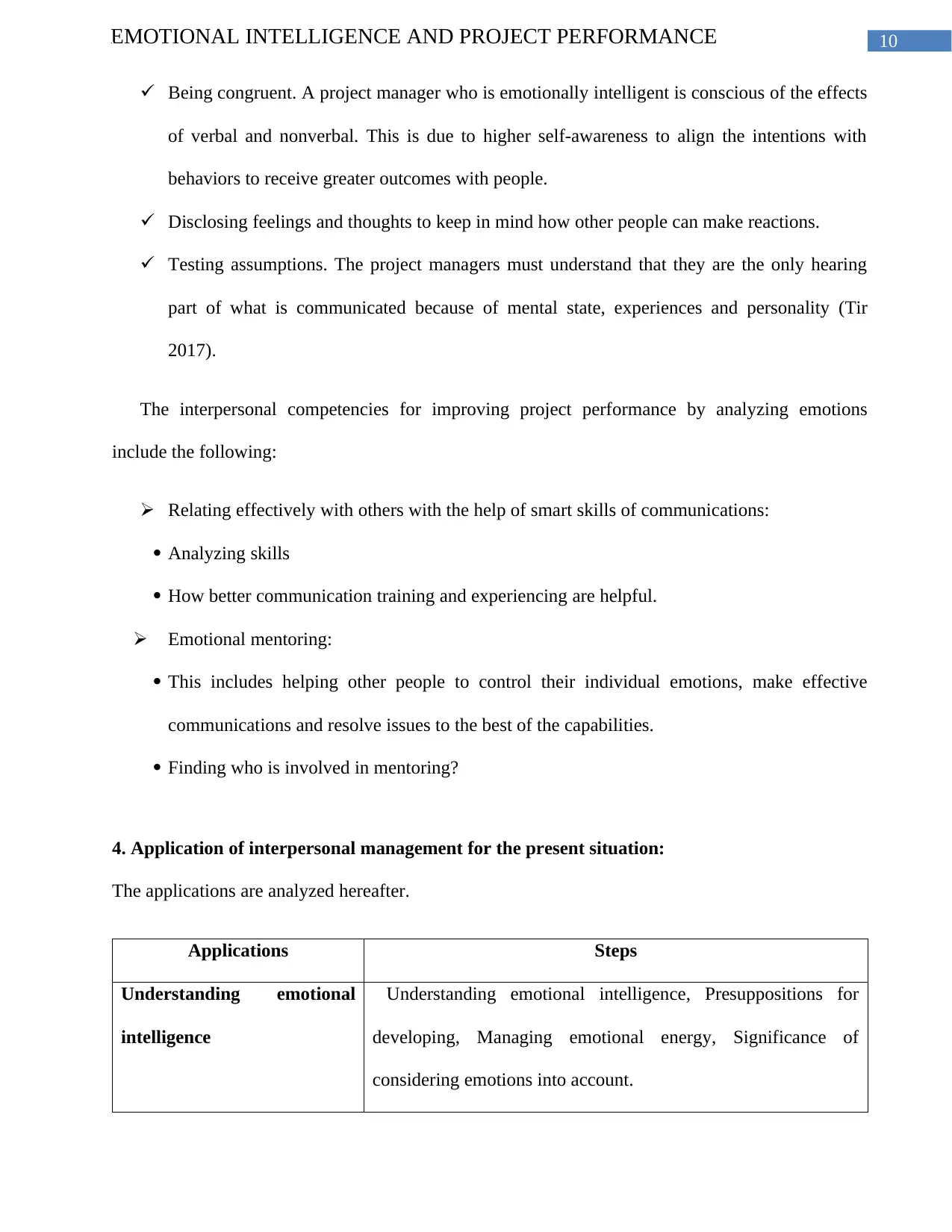
10EMOTIONAL INTELLIGENCE AND PROJECT PERFORMANCE
Being congruent. A project manager who is emotionally intelligent is conscious of the effects
of verbal and nonverbal. This is due to higher self-awareness to align the intentions with
behaviors to receive greater outcomes with people.
Disclosing feelings and thoughts to keep in mind how other people can make reactions.
Testing assumptions. The project managers must understand that they are the only hearing
part of what is communicated because of mental state, experiences and personality (Tir
2017).
The interpersonal competencies for improving project performance by analyzing emotions
include the following:
Relating effectively with others with the help of smart skills of communications:
Analyzing skills
How better communication training and experiencing are helpful.
Emotional mentoring:
This includes helping other people to control their individual emotions, make effective
communications and resolve issues to the best of the capabilities.
Finding who is involved in mentoring?
4. Application of interpersonal management for the present situation:
The applications are analyzed hereafter.
Applications Steps
Understanding emotional
intelligence
Understanding emotional intelligence, Presuppositions for
developing, Managing emotional energy, Significance of
considering emotions into account.
Being congruent. A project manager who is emotionally intelligent is conscious of the effects
of verbal and nonverbal. This is due to higher self-awareness to align the intentions with
behaviors to receive greater outcomes with people.
Disclosing feelings and thoughts to keep in mind how other people can make reactions.
Testing assumptions. The project managers must understand that they are the only hearing
part of what is communicated because of mental state, experiences and personality (Tir
2017).
The interpersonal competencies for improving project performance by analyzing emotions
include the following:
Relating effectively with others with the help of smart skills of communications:
Analyzing skills
How better communication training and experiencing are helpful.
Emotional mentoring:
This includes helping other people to control their individual emotions, make effective
communications and resolve issues to the best of the capabilities.
Finding who is involved in mentoring?
4. Application of interpersonal management for the present situation:
The applications are analyzed hereafter.
Applications Steps
Understanding emotional
intelligence
Understanding emotional intelligence, Presuppositions for
developing, Managing emotional energy, Significance of
considering emotions into account.
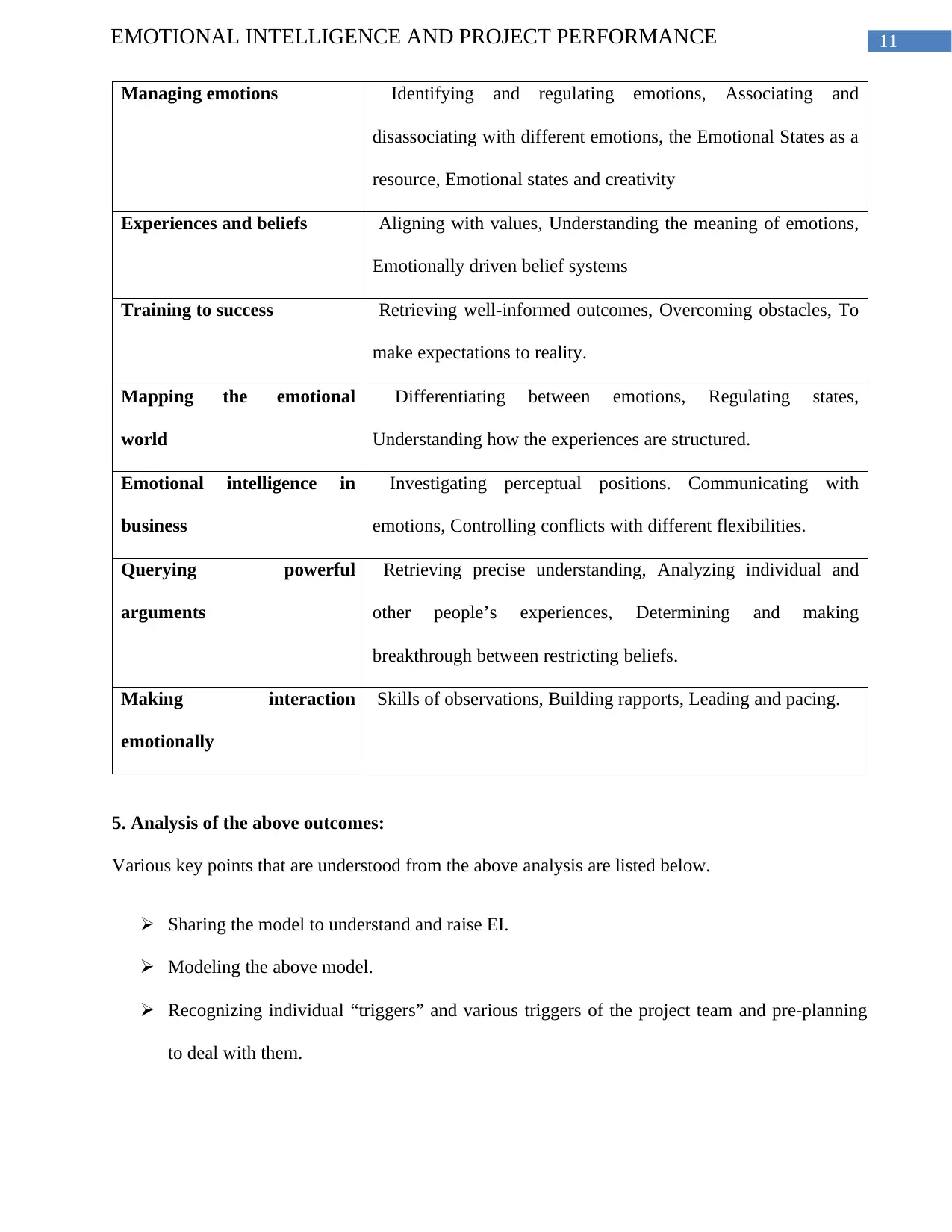
11EMOTIONAL INTELLIGENCE AND PROJECT PERFORMANCE
Managing emotions Identifying and regulating emotions, Associating and
disassociating with different emotions, the Emotional States as a
resource, Emotional states and creativity
Experiences and beliefs Aligning with values, Understanding the meaning of emotions,
Emotionally driven belief systems
Training to success Retrieving well-informed outcomes, Overcoming obstacles, To
make expectations to reality.
Mapping the emotional
world
Differentiating between emotions, Regulating states,
Understanding how the experiences are structured.
Emotional intelligence in
business
Investigating perceptual positions. Communicating with
emotions, Controlling conflicts with different flexibilities.
Querying powerful
arguments
Retrieving precise understanding, Analyzing individual and
other people’s experiences, Determining and making
breakthrough between restricting beliefs.
Making interaction
emotionally
Skills of observations, Building rapports, Leading and pacing.
5. Analysis of the above outcomes:
Various key points that are understood from the above analysis are listed below.
Sharing the model to understand and raise EI.
Modeling the above model.
Recognizing individual “triggers” and various triggers of the project team and pre-planning
to deal with them.
Managing emotions Identifying and regulating emotions, Associating and
disassociating with different emotions, the Emotional States as a
resource, Emotional states and creativity
Experiences and beliefs Aligning with values, Understanding the meaning of emotions,
Emotionally driven belief systems
Training to success Retrieving well-informed outcomes, Overcoming obstacles, To
make expectations to reality.
Mapping the emotional
world
Differentiating between emotions, Regulating states,
Understanding how the experiences are structured.
Emotional intelligence in
business
Investigating perceptual positions. Communicating with
emotions, Controlling conflicts with different flexibilities.
Querying powerful
arguments
Retrieving precise understanding, Analyzing individual and
other people’s experiences, Determining and making
breakthrough between restricting beliefs.
Making interaction
emotionally
Skills of observations, Building rapports, Leading and pacing.
5. Analysis of the above outcomes:
Various key points that are understood from the above analysis are listed below.
Sharing the model to understand and raise EI.
Modeling the above model.
Recognizing individual “triggers” and various triggers of the project team and pre-planning
to deal with them.
⊘ This is a preview!⊘
Do you want full access?
Subscribe today to unlock all pages.

Trusted by 1+ million students worldwide
1 out of 18
Related Documents
Your All-in-One AI-Powered Toolkit for Academic Success.
+13062052269
info@desklib.com
Available 24*7 on WhatsApp / Email
![[object Object]](/_next/static/media/star-bottom.7253800d.svg)
Unlock your academic potential
Copyright © 2020–2026 A2Z Services. All Rights Reserved. Developed and managed by ZUCOL.




